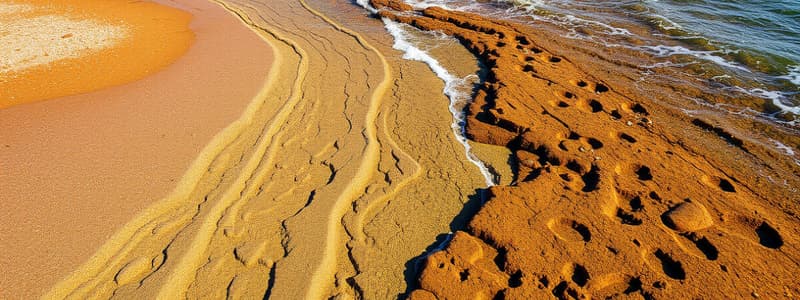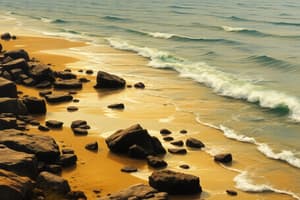Podcast
Questions and Answers
What geological feature is formed when the arch of a coastal rock structure collapses?
What geological feature is formed when the arch of a coastal rock structure collapses?
- Spit
- Cliff
- Stack (correct)
- Bay
Which process primarily leads to the formation of a beach?
Which process primarily leads to the formation of a beach?
- Underwater currents
- Deposition by constructive waves (correct)
- Glacial activity
- Erosion by waves
What distinguishes a shingle beach from a sand beach?
What distinguishes a shingle beach from a sand beach?
- Sand beaches are narrower and steeper.
- Sand beaches have more vegetation.
- Shingle beaches have larger particles and are steeper. (correct)
- Shingle beaches are wider and flatter.
Which of the following is NOT a characteristic of a beach?
Which of the following is NOT a characteristic of a beach?
How does a spit form?
How does a spit form?
What is the term for a spit that has a curved end?
What is the term for a spit that has a curved end?
Which coastal feature forms when spits join two headlands together?
Which coastal feature forms when spits join two headlands together?
What usually forms in the area behind a spit?
What usually forms in the area behind a spit?
What impact does sea level rise have on fresh water bodies near the coast?
What impact does sea level rise have on fresh water bodies near the coast?
Which coastal area experienced an increase in flooding events from 1995 to 2014?
Which coastal area experienced an increase in flooding events from 1995 to 2014?
What percentage of Bangladesh's land would be lost with just a 0.3m rise in sea level?
What percentage of Bangladesh's land would be lost with just a 0.3m rise in sea level?
What is a characteristic of low-energy coastlines?
What is a characteristic of low-energy coastlines?
Which of the following is NOT a consequence of coastal erosion?
Which of the following is NOT a consequence of coastal erosion?
What are raised beaches formed from?
What are raised beaches formed from?
What indicates a positive sediment budget at a coastline?
What indicates a positive sediment budget at a coastline?
Which coastal area is projected to have the highest flood costs by 2050?
Which coastal area is projected to have the highest flood costs by 2050?
How are sediment cells characterized?
How are sediment cells characterized?
What feature is formed when sea level rises and partially submerges river valleys?
What feature is formed when sea level rises and partially submerges river valleys?
Which process involves the compression of air in cracks of cliffs by waves?
Which process involves the compression of air in cracks of cliffs by waves?
What happens during cavitation in coastal erosion?
What happens during cavitation in coastal erosion?
What happens to the coastal ecosystems as a result of increased storms and erosion?
What happens to the coastal ecosystems as a result of increased storms and erosion?
Which of the following is NOT a way waves erode the coastline?
Which of the following is NOT a way waves erode the coastline?
What contributes to the formation of estuaries in coastal systems?
What contributes to the formation of estuaries in coastal systems?
What is a primary characteristic of abrasion in coastal erosion?
What is a primary characteristic of abrasion in coastal erosion?
What characterizes the depth of fjords compared to other coastal landforms?
What characterizes the depth of fjords compared to other coastal landforms?
Which statement about the processes affecting coastal landscapes is accurate?
Which statement about the processes affecting coastal landscapes is accurate?
How are dalmatian coastlines formed?
How are dalmatian coastlines formed?
What factors influence the selection of areas for coastal management?
What factors influence the selection of areas for coastal management?
What impact can a change in coastal processes have on landforms?
What impact can a change in coastal processes have on landforms?
What is meant by 'relict landforms' in coastal landscapes?
What is meant by 'relict landforms' in coastal landscapes?
What depth can notable fjords like Sognefjorden reach?
What depth can notable fjords like Sognefjorden reach?
How do coastal landscapes change over time?
How do coastal landscapes change over time?
What is a potential disadvantage of using gabions for coastal protection?
What is a potential disadvantage of using gabions for coastal protection?
Groynes are effective at trapping material transported by what process?
Groynes are effective at trapping material transported by what process?
Which feature of breakwaters can also act as a pedestrian walkway?
Which feature of breakwaters can also act as a pedestrian walkway?
Why might the placement of a groyne be crucial?
Why might the placement of a groyne be crucial?
What is one ecological concern associated with breakwaters?
What is one ecological concern associated with breakwaters?
Tidal barriers are particularly useful for managing what natural phenomenon?
Tidal barriers are particularly useful for managing what natural phenomenon?
Which of the following is a drawback of using groynes?
Which of the following is a drawback of using groynes?
What is the primary purpose of riprap in coastal management?
What is the primary purpose of riprap in coastal management?
Flashcards are hidden until you start studying
Study Notes
Coastal Dynamics
- Low-energy coastlines are often shielded by coral reefs or islands, resulting in fewer wave impacts.
- These coastlines feature salt marshes and tidal mudflats, where sediment accumulation exceeds erosion, promoting land growth.
- Coastal sediment inputs arise from river sedimentation, sea level rise forming estuaries, cliff erosion, and marine organism shell degradation.
- The sediment budget assesses sediment balance: a positive budget indicates land extension, while a negative budget shows coastline retreat.
Sediment Cells
- The coastline is segmented into sediment cells, which balance erosion and deposition.
- Sub-cells exist with specific material inputs and defined boundaries like headlands; theoretically, these operate as closed systems, but practical transfers may occur.
Erosion Processes
- Erosion occurs through various mechanisms:
- Abrasion: Wave-transported materials grind against coastal structures.
- Hydraulic Action: Waves compress air in cliff cracks, expanding pressure causes rock breakage.
- Cavitation: The release of compressed air from waves further erodes rock.
- Wave Quarrying: The force of waves detaches rock pieces from cliffs.
Coastal Landforms
- Beaches form from constructive wave action depositing sand or shingle.
- Shingle Beaches: Steep and narrow, composed of larger particles.
- Sand Beaches: Wide and flat, made from smaller particles.
- Distinctive beach features include:
- Berms: Ridges marking the high-tide line.
- Runnels: Sand grooves parallel to the shore.
- Cusps: Crescent-shaped markings on mixed beaches.
Spits and Bars
- Spits: Sand and shingle formations extending into the sea due to shifting coastal directions, with variations like simple, recurved, and compound spits.
- Offshore Bars: Form as materials accumulate in shallow areas, sometimes creating lagoons behind.
Impacts of Climate Change
- Increasing storm frequency and intensity heightens risks to coastal ecosystems and infrastructures.
- Rising sea levels lead to severe flooding, exemplified by Kings Point, NY, experiencing doubling flood events within a decade.
- Projected land loss includes significant areas in Bangladesh and the Maldives with minimal sea level rise.
- Saltwater intrusion threatens freshwater resources and agricultural viability, necessitating increased flood protection funding.
Coastlines of Emergence
- Sea level fall unveils new landforms:
- Raised Beaches: Higher-level beaches developed from sediment accumulation.
- Wave-Cut Platforms: Exposed surfaces from eroded former shorelines.
- Relict Cliffs: Vegetative recovery of formerly coastal cliffs.
Coastlines of Submergence
- Sea level rise results in submerged landscapes:
- Rias: Partially submerged river valleys.
- Fjords: Drowned glacial valleys with steep cliffs.
- Dalmatian Coastlines: Parallel islands formed by rising sea levels flooding valleys.
Coastal Management Techniques
- Coastal management aims to mitigate erosion and flooding impacts on populations and environments, often prioritizing urban areas for resource allocation.
- Riprap: Large rocks placed along shores to absorb wave energy, economically viable but may restrict access.
- Groynes: Structures installed to capture drifted materials, wider beaches offer better protection but can lead to downstream erosion.
- Breakwaters: Built offshore to reduce wave energy and protect coastlines, but can incur ecological costs.
- Tidal Barriers: Mechanisms across river estuaries prevent floodwaters during storms, enhancing community resilience.
Studying That Suits You
Use AI to generate personalized quizzes and flashcards to suit your learning preferences.




